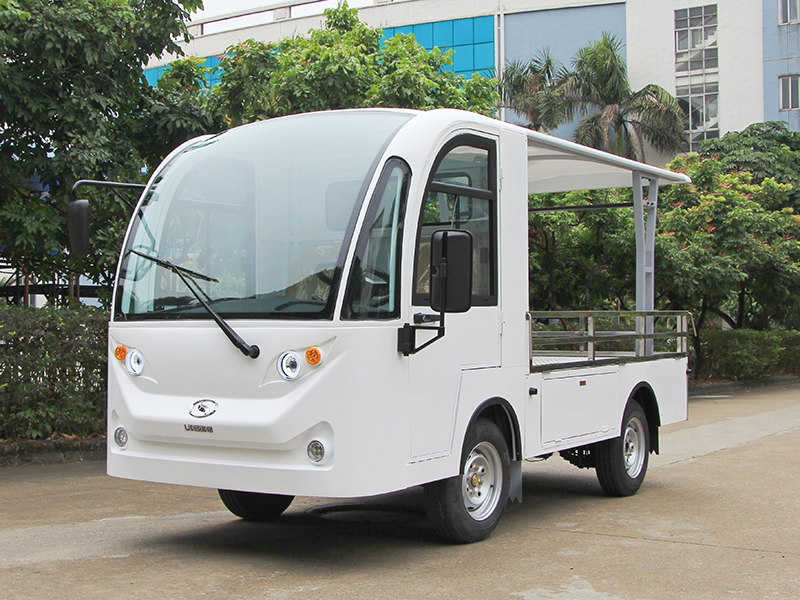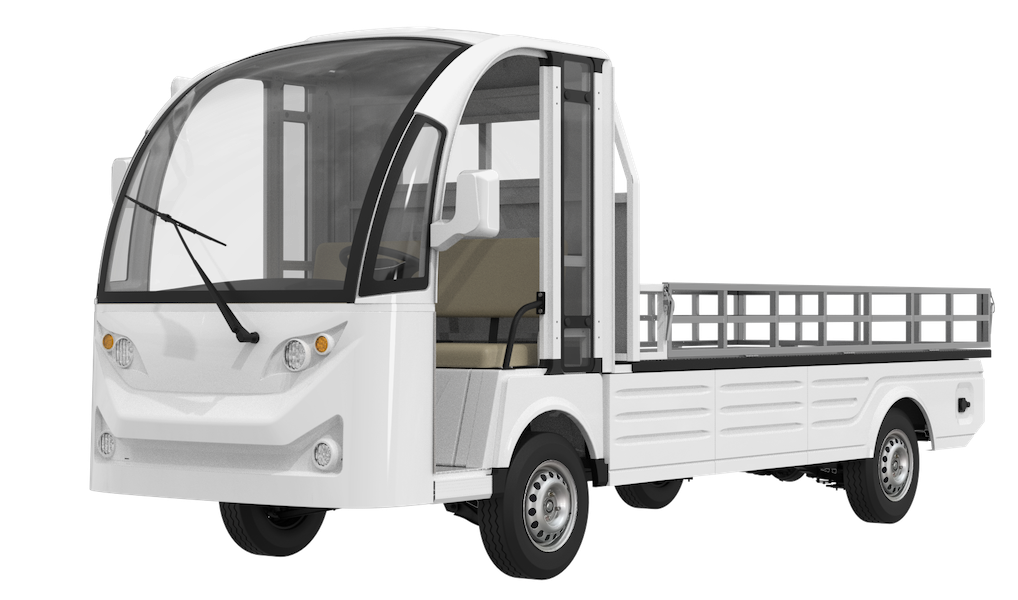Content Menu
● Overview of Electric Cargo Vehicles in Germany
● Leading Electric Cargo Vehicle Manufacturers and Suppliers
>> StreetScooter
>> Volta Trucks
>> Goupil
>> Cenntro Automotive Europe
>> Orten Electric Trucks
>> Ari Motors
>> Addax Motors
>> Other Notable Suppliers
● Key Innovations and Technologies
>> Advanced Battery Systems
>> Lightweight Materials and Chassis Design
>> Smart Fleet and Vehicle Connectivity
>> Modular and Customizable Platforms
>> Autonomous and Semi-Autonomous Capabilities
● Benefits and Applications of Electric Cargo Vehicles
● Challenges in the German Market
● Market Outlook and Future Trends
● Conclusion
● FAQ
>> 1. What types of electric cargo vehicles are most popular in Germany?
>> 2. How can businesses select the right electric cargo vehicle supplier?
>> 3. What are the maintenance requirements for electric cargo vehicles?
>> 4. Are financial incentives available for companies switching to electric cargo vehicles in Germany?
>> 5. What is the outlook for electric cargo vehicle adoption in the next five years?
As the global focus on sustainable transportation intensifies, Germany stands at the forefront of electric vehicle innovation, particularly in the realm of electric cargo vehicles. This article provides an in-depth survey of electric cargo vehicle manufacturers and suppliers based in Germany, highlighting the key players, their unique offerings, and the transformative impact these companies are having on logistics, urban delivery, and green mobility. Alongside comprehensive company profiles, you'll find detailed insights into key innovations, benefits, challenges, and market outlook to help stakeholders understand this rapidly expanding sector.

Overview of Electric Cargo Vehicles in Germany
Electric cargo vehicles, designed specifically for commercial use such as deliveries and logistics, are increasingly integral to Germany's efforts to reduce emissions and improve urban air quality. These vehicles vary widely, from compact urban electric vans suited for last-mile delivery, to heavier trucks capable of handling bulk freight. Backed by robust federal and state incentives and an evolving infrastructure, the German electric cargo vehicle market is thriving.
With tightening environmental regulations in urban centers and growing demand for sustainable business practices, the ecosystem of electric cargo vehicle manufacturers and suppliers in Germany is rapidly diversifying and innovating. This diversity allows customers to choose from a range of suppliers offering vehicles tailored for specific industries such as e-commerce delivery, municipal services, industrial transport, and more.
Leading Electric Cargo Vehicle Manufacturers and Suppliers
StreetScooter
StreetScooter is a standout pioneer in Germany's electric cargo vehicle landscape. Originating as a project from RWTH Aachen University and later developed under Deutsche Post DHL Group, StreetScooter revolutionized fleet electrification with affordable, customizable electric vans designed for urban logistics. Their modular design allows clients to adjust cargo space, battery size, and drivetrain according to their operational needs. StreetScooter models are widely deployed in parcel and food deliveries, demonstrating proven durability and efficiency within dense city environments.
Volta Trucks
Though headquartered in Sweden, Volta Trucks maintains close operational ties with Germany, focusing on fully electric, purpose-built urban logistics trucks. Their flagship Volta Zero model has attracted attention for integrating advanced safety features, an expansive cargo area optimized for city freight, and a competitive driving range. Volta Trucks collaborates with key German suppliers and logistics organizations to expand electric freight options, pushing forward sustainability in commercial transport.
Goupil
Goupil specializes in compact, versatile electric vehicles that serve a broad swath of markets such as municipal maintenance, industrial transport, and light freight delivery. Their range includes compact vans, flatbeds, and container carriers suitable for inner-city usage where efficiency and maneuverability are critical. Goupil vehicles are popular among German municipal authorities who seek low-emission solutions for local services including waste collection and utility support.
Cenntro Automotive Europe
Based in Herne, Cenntro Automotive Europe develops agile and efficient light electric commercial vehicles with a focus on modularity. Their offerings cater to small and medium-sized fleet owners, municipal operators, and corporate clients requiring flexible transport solutions. Cenntro vehicles emphasize user-friendly design, low total cost of ownership, and adaptability to various industries such as retail, maintenance, and light cargo transportation.
Orten Electric Trucks
Orten Electric Trucks offers a unique value proposition by converting conventional commercial trucks into fully electric vehicles, enabling fleet operators to retrofit existing vehicles rather than incur the cost of full replacement. This sustainable approach reduces waste while supporting the electrification of trucking fleets. Orten focuses on medium-duty trucks and cargo vehicles, aligning with market demand for electrified transport that does not compromise payload or operational flexibility.
Ari Motors
Ari Motors blends German engineering with practical urban mobility needs by producing a range of light electric vans and trucks optimized for city and suburban logistics. Their models prioritize affordability, ease of maintenance, and the capability to navigate narrow streets and congested zones. Ari Motors vehicles are widely used for commercial deliveries, service vehicles, and small-scale cargo transport.
Addax Motors
Addax Motors, although headquartered in Belgium, operates a strong distribution and assembly network in Germany, offering microvans designed for last-mile operations. Their compact, electric-powered vehicles are ideal for dense urban areas, campuses, resorts, and industrial sites needing efficient, low-emission transportation. Addax's microvans have gained traction in German markets focused on green logistics and internal facility mobility.
Other Notable Suppliers
Besides the major manufacturers, several other suppliers contribute significantly to Germany's electric cargo vehicle landscape:
- Piaggio Commercial produces electric cargo tricycles and small vans suited for highly congested urban environments where maneuverability is key.
- ElectricBrands innovates with modular electric vehicles such as the XBUS, offering versatile platforms that can be customized by businesses for various cargo and service applications.
- Tropos Motors Europe specializes in compact utility EVs perfect for municipal use and city logistics, blending simplicity and electric efficiency.

Key Innovations and Technologies
Germany's leadership in electric cargo vehicle manufacturing is underpinned by continuous technological advancements, fostering the development of smarter and more capable vehicles:
Advanced Battery Systems
Improved energy density and battery management systems allow longer ranges and faster charging times, addressing two critical limitations in electric vehicle adoption. German manufacturers have integrated cutting-edge lithium-ion technology and are exploring solid-state and alternative chemistries to further enhance performance and lifecycle.
Lightweight Materials and Chassis Design
Innovative use of lightweight aluminum alloys, composites, and high-strength steel in chassis construction improves energy efficiency by reducing vehicle weight without compromising durability or payload capacity.
Smart Fleet and Vehicle Connectivity
Comprehensive telematics solutions, IoT integration, and real-time data analytics enable fleet managers to optimize routes, monitor vehicle health, and forecast maintenance proactively. This connectivity lowers operational costs and enhances vehicle uptime, critical for commercial logistics.
Modular and Customizable Platforms
Manufacturers are increasingly offering modular vehicle architectures, allowing customers to tailor cargo volume, powertrain type, and vehicle dimensions according to sector-specific requirements. This flexibility addresses diverse logistics scenarios, from dense urban delivery to industrial goods transportation.
Autonomous and Semi-Autonomous Capabilities
While still in early stages, several German manufacturers and technology partners are experimenting with autonomous driving systems for last-mile delivery, aiming to increase safety and operational efficiency.
Benefits and Applications of Electric Cargo Vehicles
Electric cargo vehicles are revolutionizing logistics and transport across Germany with a multitude of advantages:
- Zero Tailpipe Emissions: Crucial in meeting urban air quality standards and reducing the overall carbon footprint of delivery and service fleets.
- Lower Operating and Maintenance Costs: Fewer moving parts translate to less frequent repairs and lower fuel (electricity) costs compared to diesel or petrol vehicles.
- Reduced Noise Pollution: Quiet electric powertrains enable night-time or early morning deliveries in noise-sensitive residential zones.
- Greater Versatility: Thanks to modular designs and a range of vehicle sizes, electric cargo vehicles can be deployed in multiple sectors, from courier services to municipal waste collection.
- Branding and Corporate Social Responsibility: Using electric vehicles publicly signals a company's commitment to sustainability, increasingly valued by consumers and regulators.
Typical applications include last-mile parcel and grocery delivery, facility and grounds maintenance, city waste management, specialized trade services like portable workshops, and even construction site logistics.
Challenges in the German Market
Despite promising growth, German electric cargo vehicle manufacturers and suppliers must navigate a number of challenges:
- Charging Infrastructure Gaps: Development of fast, high-capacity charging stations suited to commercial fleet depots is uneven across regions, hindering scalability.
- Initial Purchase Costs: Although total cost of ownership is attractive over time, upfront prices remain a barrier, particularly for smaller fleet operators.
- Range Constraints: Current battery ranges comfortably support urban routes but still limit operations involving longer rural deliveries or high payloads.
- Complex Regulatory Environment: Navigating the layered incentives, certification standards, and compliance requirements across Germany's federal states can be complex and time-consuming.
- Supply Chain Vulnerabilities: Ongoing shortages and price fluctuations in battery raw materials and semiconductors impact production schedules and costs.
Market Outlook and Future Trends
The outlook for electric cargo vehicles in Germany remains robust, supported by regulatory mandates and rising corporate sustainability commitments. Key trends shaping the future include:
- Increasing Automation: Integration of automated driving aids, from parking assistance to platooning, aimed at improving efficiency and safety.
- Expanding Charging Solutions: Infrastructure investments focused on ultra-fast chargers and wireless charging technologies, easing operational bottlenecks.
- Broader Geographic Reach: Targeting regional and rural logistics with enhanced range capabilities and hybrid powertrain options.
- Renewable Energy Integration: Linking electric vehicle fleets with onsite solar arrays and grid-scale green energy to further reduce environmental impact.
- Collaborative Innovation: Growing partnerships between manufacturers, technology firms, cities, and logistics providers to pilot and scale innovative concepts.
Germany's combination of engineering expertise, policy support, and entrepreneurial vigor ensures its electric cargo vehicle sector remains at the cutting edge of sustainable urban mobility.
Conclusion
Germany's electric cargo vehicle industry is a dynamic and rapidly expanding segment that exemplifies the country's commitment to sustainable transportation. Leading manufacturers and suppliers are innovating across vehicle design, battery technology, and fleet management to meet the complex demands of urban logistics and municipal applications. Although challenges remain—particularly around infrastructure and upfront costs—the trajectory for wider adoption is strong. Germany's ecosystem is not only reducing emissions but also setting global benchmarks for efficient, adaptable, and responsible commercial transport solutions. As the market evolves, these electric cargo vehicle manufacturers and suppliers will continue to drive green logistics into the future, empowering businesses and cities alike to achieve smarter, cleaner mobility.

FAQ
1. What types of electric cargo vehicles are most popular in Germany?
Primarily, electric vans and light trucks dominate the market, favored for urban deliveries, maintenance, and municipal services. Compact microvans and specialty vehicles designed for waste collection, food delivery, and facility support also see increasing adoption as part of last-mile logistics solutions.
2. How can businesses select the right electric cargo vehicle supplier?
Businesses should evaluate suppliers based on product range, customization capabilities, after-sales support, and total cost of ownership. Considering a supplier's track record in relevant industries and local service infrastructure is also crucial. Many German manufacturers offer modular platforms that can be tailored to specific cargo and operational needs.
3. What are the maintenance requirements for electric cargo vehicles?
Compared to internal combustion engine (ICE) vehicles, electric cargo vehicles require less frequent maintenance. Important aspects include battery health monitoring, tire condition, brake systems (often reduced wear due to regenerative braking), and regular diagnostics of electrical components. Many suppliers provide comprehensive maintenance packages and remote monitoring tools to support operators.
4. Are financial incentives available for companies switching to electric cargo vehicles in Germany?
Yes. The German government offers various federal and state-level grants, subsidies, and tax incentives designed to lower the cost of switching to electric fleets. These can include purchase rebates, incentives for installing charging infrastructure, and reduced vehicle taxes.
5. What is the outlook for electric cargo vehicle adoption in the next five years?
Adoption is expected to accelerate significantly. Stricter emissions legislation, improvements in battery technology, expanding charging networks, and growing environmental awareness among businesses will drive fleet electrification. Urban logistics and municipal sectors are likely to see particularly rapid growth, positioning electric cargo vehicles as a mainstream choice.



















































